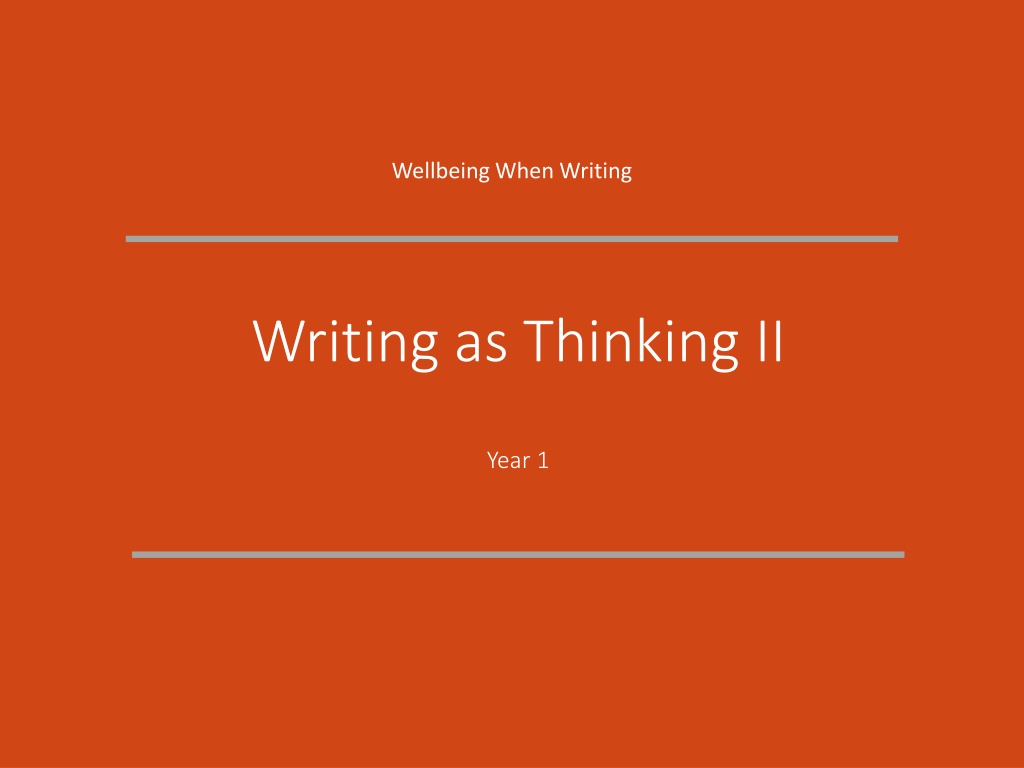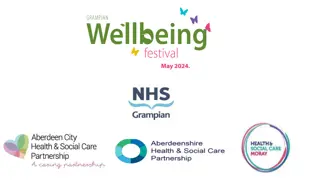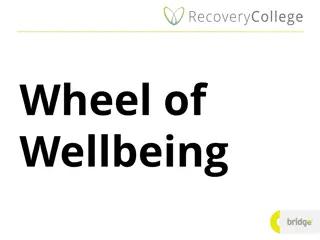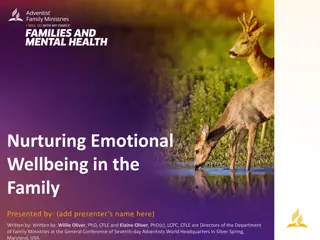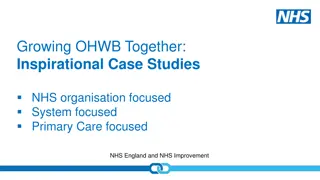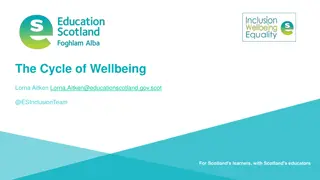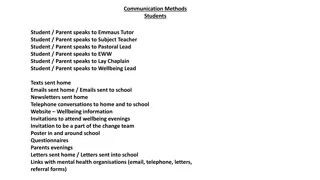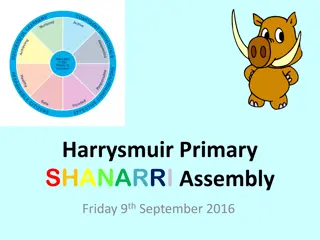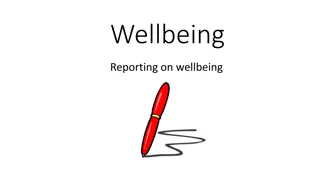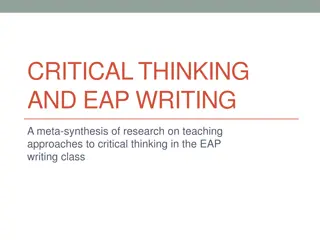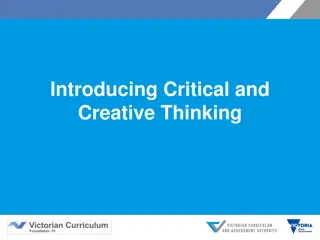Enhancing Wellbeing Through Writing: Writing as Thinking
Explore the connection between writing and thinking as a vital tool for academic writing. Delve into strategies for effective writing, evaluating its impact on rigorous thinking, and overcoming challenges through reflective writing exercises.
Download Presentation

Please find below an Image/Link to download the presentation.
The content on the website is provided AS IS for your information and personal use only. It may not be sold, licensed, or shared on other websites without obtaining consent from the author. Download presentation by click this link. If you encounter any issues during the download, it is possible that the publisher has removed the file from their server.
E N D
Presentation Transcript
Wellbeing When Writing Writing as Thinking II Year 1
Delivered by: Delivered by: [Facilitator Name], [Facilitator Title}
Learning outcomes: Learning outcomes: Apply strategies for Writing as Thinking that will be helpful for APR1 Evaluate a range of approaches to writing your Introduction and Literature Review Create draft material that could be used for your Introduction & Literature Review
Evaluate the statement: writing is thinking Evaluate the statement: writing is thinking Think about the relationship between writing and thinking i.e. that writing is necessary for rigorous thinking, indeed that writing is thinking. This is true for all writing, whether scientific or more discursive.
Recap Recap Have your opinions changed since the introduction workshop? Have you been using this approach in your own writing? (How) has it been successful? What challenges have arisen?
Begin writing about anything that comes to Begin writing about anything that comes to mind mind This strategy is particularly useful if you have written very little so far. Think of it as a warm-up exercise to get your creative juices flowing. For example you could begin by writing about your preliminary data, data published by others, or the goals of your research. Do not worry about grammar or even accuracy. Just get words on the page for about 15-20 minutes.
Begin writing about anything that comes to Begin writing about anything that comes to mind mind Ideas are born with writing, and the more you write the more ideas you will have. Even when you are in a rhythm of writing, it helps to begin your day by just jotting down ideas for the first 15-20 minutes. Remember, ideas are useless inside your mind they need to be on paper and explained so others (particularly your thesis committee) can understand them. Most of this writing will not make it into your final draft, but it will help you to create new ideas.
Writing as thinking Writing as thinking Spend ten minutes free-writing on the topic of your research Allow yourself to write whatever comes to mind. Don t judge, don t edit, don t censor. DON T STOP WRITING Keep your hand moving across the page for the full ten minutes
Writing as thinking Writing as thinking Now read back through what you ve written. Underline or highlight any new ideas that occurred to you as you were writing. This may be something you hadn t considered about the project before, a new angle or perspective, an answer to a question you ve been stuck on.
Writing as thinking Writing as thinking The act of WRITING can be a tool for THINKING it can help you to think through a topic or project as you write. This can be used in free-writing before you begin a new chapter or section of your work It can help you to think through what you want to write before you start writing formally
Writing as thinking Writing as thinking It can also be a tool that you use and develop WHILE writing a chapter or section. As you write, your ideas will change, grow and develop. By the end of your chapter, you may not think exactly what you thought at the beginning.
Writing as thinking Writing as thinking This is why editing and redrafting is important and why you should always allow yourself enough time to edit and redraft a chapter or section before you need to hand it in. Once you get to the end of your first draft, you can go back and rework it so that the conclusions you have come to through writing are supported throughout the whole chapter.
What types of information should you include in What types of information should you include in your introduction? your introduction? In the introduction to your thesis, you ll be trying to do three main things which are called Moves Move 1: establish your territory (say what the topic is about) Move 2: establish a niche (show why there needs to be further research on your topic) Move 3: introduce the current research (make hypothesis, state the research questions Each move has a number of stages. Depending on what you need to say in your introduction, you might use one or more stages. Most thesis introductions include some, but not all, of the following stages:
Stages in thesis introduction Stages in thesis introduction Move 1 State the general topic and give some background Provide a review of the literature related to the topic Define the terms and cope of the topic
Stages in thesis introduction Stages in thesis introduction Move 2 Outline the current situation Evaluate the current situation (advantages/disadvantages) and identify the gap
Stages in thesis introduction Stages in thesis introduction Move 3 Identify the importance of the proposed research State the research problem/questions State the research aims and/or research objectives State the hypotheses Outline the order of the information in the thesis Outline the methodology
Writing as thinking Writing as thinking Now spend at least ten minutes re-drafting your free- writing notes. Imagine this is for your thesis introduction. How will you approach this task now? Which ideas will you foreground in this new version?
Writing as thinking Writing as thinking Your first draft is your opportunity to discover what you think about a topic and formulate your argument. THIS IS NOT THE END OF THE PROCESS. Once you know what you think and where you re going with it, it s usually necessary to go back and redraft your writing with the clarity you ve gained from the first draft process. Ensure you give yourself enough time to do this.
Physical wellbeing exercises, rest Physical wellbeing exercises, rest- -breaks & strategies for movement strategies for movement Learn a series of simple and effective wellbeing exercises that are suitable for all and can be done anywhere. No special clothing or equipment is required, you can do these exercises wherever you are, and they can be practised every day. It s a simple five minute movement sequence that has a lasting positive impact. Synchronise the movements with your breathing for added benefits. A YouTube version of the wellbeing exercises, made by Giles Bryant who developed the sequence, can be found here: https://www.youtube.com/watch?v=S_jwJwHA554 https://www.youtube.com/watch?v=m10uiHU7uAw breaks &
Writing the literature review Writing the literature review How might you use writing as thinking to help prepare for your literature review?
Writing as thinking Writing as thinking Taking quotations and notes during reading Free-writing and summarising after reading Keep writing throughout the process to help you engage with the material and think through its relevance to your own research project
Free Free- -writing activity writing activity How does the literature you have read shape, complement and challenge your research project? Try to consider each of these three aspects as you write. Write for ten minutes
Writing it up Writing it up The task of shaping a logical and effective report of a literature review is undeniably challenging. Some useful guidance on how to approach the writing up is given by Wellington et al (2005:87): It should be framed by your research questions. It must relate to your study. It must be clear to the reader where it is going: keep signposting along the way. Be in control, not totally deferent to or tossed about; by previous literature. Be selective. Ask why am I including this? It is probably best to treat it as a research project in its own right. Engage in a dialogue with the literature, you are not just providing a summary.
Writing it up Writing it up In most disciplines, the aim is for the reader to reach the end of the literature review with a clear appreciation of what you are doing; why you are doing it; and how it fits in with other research in your field. Often, the literature review will end with a statement if the research question(s). Having a lot of literature to report on can feel overwhelming. It is important to keep the focus on your study, rather than on the literature (Wellington 2005). To help you do this you will need to establish a structure to work to. A good well- explained structure is also a huge help to the reader.
Writing it up Writing it up As with any piece of extended writing, structure is crucial. There may be specific guidance on structure within your department, or you may need to devise your own. For example: Chronologically; be careful not to just list items; write critically, not just descriptively Thematically; useful if your topic has several strands that can be considered separately before bringing them together By sector; e.g. political, practice, methodological, geographical, or literary background By development of ideas; useful if there are identifiable stages of idea development A combination of the above
Writing it up Writing it up a narrative thread a narrative thread Although you need to write in an academic style, it can be helpful to imagine that you are telling a story. The thread running through the story is the explanation of why you chose your study. The story needs to be logical, informative, persuasive, comprehensive and, ideally, interesting. It should reach the logical conclusion that your research is a good idea. If there is a key article or book that is of major importance to the development of your own research, it is important to give it extra space to describe and critique in more depth. Similarly, if there are some studies that you will be referring to more than other, it is useful to give them a full report and critique at this stage.
Writing your literature review Writing your literature review Look again at your free-writing notes. Is there a narrative thread running through your argument? How might you redraft your notes to give shape to a narrative thread? Which structural approach will you take? chronology, theme, sector, development of ideas, or a combination of all these?
Storyboard your literature review Storyboard your literature review Use the storyboarding templates to create a narrative for your thesis. Which shape would best suit your project? How might you make links and connections between the different chapters and sections?
Writing your literature review Writing your literature review Spend at least ten minutes redrafting your free-writing to give it the shape of a Literature Review.
Breathing for wellbeing Breathing for wellbeing Learn effective techniques for conscious breathing, which can be done any time, anywhere, by anyone. Becoming more aware of your breathing can help to reduce stress and calm the stress-responses in your body. Breathing consciously for three minutes a day can have a long lasting positive impact on your physical and mental wellbeing. A video to help you practice the Three-Minute Breathing Space can be found here: https://www.mindful.org/the-three-minute-breathing-space- practice/
Workshop Workshop In pairs or small groups, share one piece of writing you have worked on today either your draft introduction or your draft literature review Give feedback, including: Clarity of the introduction does it introduce an idea and follow it through? Narrative thread in the literature review is it structured according to theme, chronology, or something else?
Plenary Discussion Plenary Discussion Writing is necessary for rigorous thinking, Indeed writing is thinking. This is true for all writing, whether scientific or more discursive. How have your thoughts and opinions on this statement changed or developed as a result of this workshop? How might you apply writing as thinking to help you prepare for APR1?
Further information (online) Further information (online) #PhDchat #PhDAdvice #AcWri #ShutUpAndWrite @WriteThatPhD https://thesiswhisperer.com https://www.vitae.ac.uk
General Mathematics
